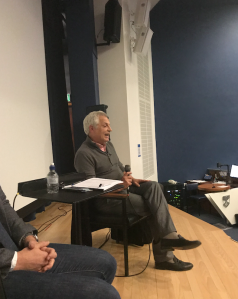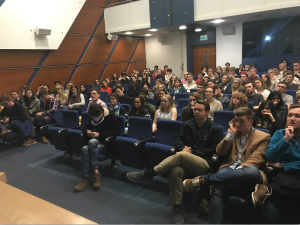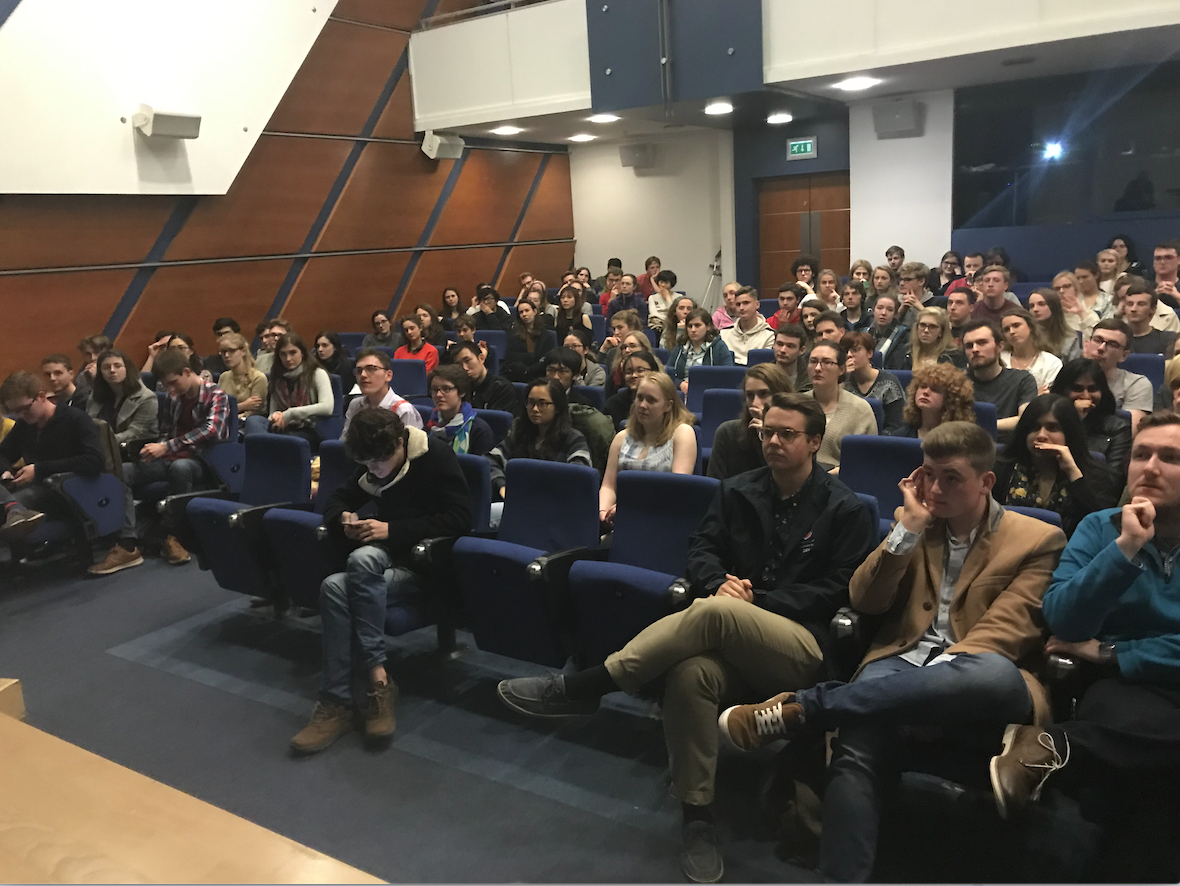
Last night I had the privilege of speaking at this debate in St Andrews – I believe it was the first of this kind that the CU have organised. I loved it. The place was relatively full, the chairman was excellent and my opponent, Dr Manfredi La Manna, reader of Economics at University of St Andrews, was pleasant, affable and spoke well.

However I found his arguments quite astonishing. He wanted to go further than Christianity being a delusion – he wanted to call it the greatest fraud. He argued that there were seven conditions that were required for religion to be real and prosper..
- Christianity had to come in credulous times –
- Christianity occurred just in the one place –
- Christianity used a book in an age of illiterate people.
- Christianity created a caste of priests.
- In order to be true Christianity had to be permanent (he later qualified this to mean that the evidence had to be permanent).
- The Bible would have to be perfect.
- Christianity would have to be beneficial to society.
As you can imagine these were all a gift! I enjoyed responding to them after giving my own initial presentation. I wonder how you would have responded…? Here is a brief summary.
- We live in credulous times – therefore Christianity must be flourishing! There is no evidence that the 1st Century was any more credulous than the 21st.
- There is no reason logically why this should make Christianity untrue. By definition Christ could only come in one place. We are now all over the world.
- And we taught them to read because Christianity is about education. Without the Book then we are at the mercy of various religious gurus.
- We created a priesthood of all believers.
- Christianity is permanent. We are still here. And so is the evidence.
- It is.
- It is….the University of St Andrews would not have existed without Christianity.
There was of course much more than that. I thought the questions were excellent and in some cases very difficult (the usual ones on feminism, homosexuality and science). I loved being faced with these challenges and thought that the participation of the students was excellent.
Some arguments from Dr La Manna stuck out. He claimed that he would not believe something unless it was 99.99999% certain – which I pointed out meant that his own discipline, (economics), was redundant!
He also encouraged students to get an online bible and google it for words and quotes. I suggested that St Andrews students as intelligent human beings would be far better of actually reading books rather than just googling for quotes!
 He tried to use mockery putting up a couple of bible verses as if they were self-evidently ridiculous. Its hard to deal with those in a short space of time – but it can be done! (although I am not sure I did it well).
He tried to use mockery putting up a couple of bible verses as if they were self-evidently ridiculous. Its hard to deal with those in a short space of time – but it can be done! (although I am not sure I did it well).
He also claimed that the Bible was written by seven year olds – although he apologised for that to me afterwards – not least because if did not help his case!
The final lesson for me was the amount of harm that liberal theologians do. I think Dr La Manna struggled a bit because he was surprised to find that I actually believed the bible. He suggested that ‘scholars’ thought otherwise – but did not cite any (although there are plenty).
Overall I loved the evening and thought it was very useful in terms of the Gospel. Several students spoke to me afterwards and asked about bible study, or Magnificent Obsession or asking more questions. Years after the event the Matt Dilahunty debates continue to produce fruit – one student told me that he had been an atheist but partly because of those debates (which he had listened to six times!) was now an agnostic….
Debating Delusions – Proclaiming Christ in the Public Square
The Atheist Experience – First Debate with Matt Dillahunty – Why I am not an Atheist
Part 2 of Debate with Matt Dillahunty on Premier

Sounds like a great debate David. Will it be posted online?
Sadly – no…
What an opportunity to share the gospel, David ,and God bless the students of St Andrews .
“We live in credulous times – therefore Christianity must be flourishing!”
Certain versions of Christianity are indeed flourishing. Your church is growing. There are a good few people who believe Vicky Beeching is more of Christian than you.
“There is no evidence that the 1st Century was any more credulous than the 21st”
And the times then and inbetween? So what were the times when women were burned for being witches. That takes a high degree of credulity and conviction in ones reading of the Bible. But you are right, we do live in credulous times. Evangelical Christians go on their wee missions to various parts of Africa and say that homosexuality is a western sin brought to Africa. And people believe that as if there was not a mountain of evidence to say otherwise.
“There is no reason logically why this should make Christianity untrue. By definition Christ could only come in one place. We are now all over the world.”
I have wondered about this. I suppose it depends on whether or not you believe in Biblical timelines. Afterall, if it was only 2000 years ago that Christ came and you can only get to Heaven through Him then one wonders about the souls of the countless millions of people who had lived and died prior to his birth. And then it took some 1700 hundred years to reach Australia. There have been people in Australia for 75,000 years. I mean that is some delay and some large exclusion of humans.
“And we taught them to read because Christianity is about education. Without the Book then we are at the mercy of various religious gurus.”
Taught to read so they could read the Bible you mean. And not for some 1500 years later. The elites carried and interpreted and debated the meaning of written versions of Biblical text. The non-educated were not educated at all. It can be claimed as a solid Protestant victory though when it did happen.
“We created a priesthood of all believers.”
Who still look to the actual priest caste for its “do as I say, not do as I do message”. And if we extend that down to that priesthood of all believers then we see hypocrisy on a mass scale.
“Christianity is permanent. We are still here. And so is the evidence.”
Its permanent because we teach it. It is not natural, it is not part of our genetic make-up or some innate level of knowledge we are born with. Erase all human knowledge. Erase all our books, places of learning and study, teardown churches and religious iconography. There is not an unreasonable chance that humans could rediscover much of what we have studied and found and learned. No-one would discover Christianity.
“It is.”
The Bible has one or two contradictions. One or two grey areas. If it was perfect it would not be so contested. It would not have so many versions.
“It is….the University of St Andrews would not have existed without Christianity.”
As it was founded no. But the idea that it was Christianity that developed university style centres of learning first is wrong. The degree system may not have a direct parallel but Cordoba in Spain became famous under Muslim rule for its centres of learning some 400 years before St Andrews Uni was formed. Obviously the Greeks and Chinese had centres of learning well before the birth of Christ. So whilst St Andrews Uni was indeed a Christian idea, we dont know where things would have went if other religions dominated.
Yes – there are people who believe Vicky Beeching is more Christian than me….your point?
People being burned for being witches was more folk superstition than biblical Christianity.
God revealed himself in different ways and manners – pre Christ they pointed forward to him – after they pointed back…
There are and have been plenty who teach against Christianity – and yet they cannot get rid of it…
‘If it was perfect it would not be contested’ – that does not logically follow at all. The imperfect always contests the perfect!
Yes – we do know about what would happen if other religions dominated – because we have countries where they did and do!
“I have wondered about this.”
Exiled Humanist ,I take from your post that either you are a lapsed believer , or you are a seeker of answers concerning Christ. I do hope that you will stay around on this blog site because there are many wise and clever contributors who will answer truthfully in Christ about many of the things we wonder about.
Yes! Its the Rev David Robertson’s blog site , and I am encouraged in his ministry and depth of understanding in Christ . I am however equally blessed , informed and educated by many of those who have had little in they way of theological training , and yet blow me away with their depth of knowledge and understanding in a confused and ( in some cases) blind world , to the beauty of Jesus Christ.
The answers will come !
You [Exiledhumanist] quite rightly go on to link the query about those who died before Christ’s birth with the apparently slow rate of Christian missions to take the name of Christ to every part of the world. However the Bible provides answers about those who died before Christ that have a bearing on what has happened after he came and it is worthwhile to study the Old Testament appropriations of the promise of Christ’s coming before trying to deal with the ‘task unfinished that drives us to our knees’.
(The entrance is narrow so that those who seek it can clearly see that they need look nowhere else; so it is a necessary caveat that the one who finds it must put on their own oxygen mask first – so to speak – before assisting others. Now is the accepted time!)
A key example of God revealing himself in different ways at different times is given in Exodus 6 where Moses is told how the Patriarchs knew God as El Shaddai [‘God Almighty’] without having the meaning of God’s name YHWH [‘the LORD’] demonstrated to them as was now going to happen to the Israelites in the Exodus.
Having a saving knowledge of Jesus Christ is simply a matter of looking and living but that knowledge is expandable to more books than the world is able to contain. Some understanding seems to come along with conversion but other things might concern us for the rest of our Christian lives. For Abraham, with less knowledge than is available to us, it was simply a matter of ‘Shall not the Judge of all the earth do what is just?’
Yours,
John/.
Hi David,
Love your blog.
Were the questions about homosexuality and the like, attempts to try and catch you out? I.e: what do you think about homosexuality and why are you such a homophobe?
I don’t know…I think they were genuine questions….as to what I think about homosexuality – if you search the blog I have written several articles on sex and sexuality….basically I hold to the biblical position – that sex should be reserved for marriage and that marriage is between a man and a woman…
“Christianity used a book in an age of illiterate people.”
This is a strange objection for several reasons. Firstly, of course, there was no ‘book’ for the first 350 years of Christianity. It was only at the end of the fourth century that the Church made a final decision as to the list of inspired books in the New Testament. During those years use was made of the Gospels and Epistles but there was no common agreement on the entire list of writings which are inspired.
Secondly, Jesus never commanded his followers to write a book. He merely commanded them to ‘teach all nations’. For the first few decades of the existence of Christianity there were no Gospels in the form of ‘books’. Paul’s Epistle to the Romans wasn’t written until at least 20 years after the death and resurrection of Christ. No ‘book’ was used to transmit Christianity during the early years of its existence.
Thirdly, Plato wrote at a time when most people were illiterate. Does that, of itself, mean that Plato’s ideas were false? How were most people to receive any ideas at a time when most people were illiterate?
Fourthly, can illiterate people not hear a ‘book’ being read to them?
Fifthly, and, okay, this is an objection which can only be used by Catholics, at no time were people expected to be able to decide for themselves what the Bible taught. Christ provided a Church and a promise that its teachings would always be safeguarded by the Holy Spirit. The objection about illiteracy only makes sense if there is a claim that everybody should read the Bible for themselves and decide, personally, on what it teaches. (And, incidentally, it is not just a matter of removing illiteracy. Even if everybody had been literate in the fifth century AD, very few people at that time would have been able to buy a copy of the Bible. It was only after the invention of the printing press that Bibles became more affordable but even then, how many working class people/peasants/ordinary people (or however you would like to describe them) could afford to buy a Bible?)
Today, in the car, I caught most of an excellent BBC Radio 4 programme “University Unchallenged”. It was about academic conformity in universities. Wide ranging, it touched on topics of liberal-left politics of most academics particularly in the humanities, gender, squashing over 40 years of studying into genetics, biology, social science/humanities, rewriting empire history. Debate and open discussion is being curtailed, with some scholars keeping their heads down. Well worth a listen, on iplayer.
PS. It was on at 11:00 am